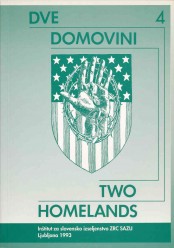Sociolinguistic Studies of Slovene Immigration Issues
Abstract
The author presents the achievements of research into Slovene emigration in the field of sociolinguistics and points to the directions of future development. The point of contact between sociolinguistics and emigration is the study of bi- and multi- lingualism, in this case the linguistic tie between Slovene and the dominant language of the country of immigration. In addition to a critical evaluation of research to date (e.g. R. L. Lenček, F. J. Kess, J. Paternost and others) the author also speaks of her own work in some detail.
Downloads
References
Arko, A. 1990. Slovenščina na Goriškem kot jezik v stiku. Slavistična revija 4: 376-398.
Bell, A. 1984 Language style as audience design. Language in Society 13, 2: 145-204.
Bennett, L. 1976. Patterns of Ethnic Identity among Serbs, Croats and Slovenes in Washington, D. C. Ph. D. dissertation, The American University, Washington, D. C.
Birsa, I. 1990. Ethnic Radio in Australia and Slovene Language Broadcasting: Development and Direction. Dve domovini/Two Homelands 1: 219-239.
Giles, H., Taylor, D. M. & Bourhis, R. Y. 1973. Toward a theory of interpersonal accommodation through language: Some Canadian data. Language in Society 2: 117-192.
Giles, H. & Johnson, P. 1981. The role of language in ethnic group relations. In Giles, H. & St. Clair, R. N. (eds.) Language and Social Psychology. Oxford: Blackwell. 45-65.
Giles, H. & Johnson, P. 1987. Ethnolinguistic identity theory: a social psychological approach to language maintenance. International Journal of the Sociology of Language 68: 69-99.
Hočevar, T. 1987. Geographical Distribution, Age Structure, and Comparative Language Maintenance of Persons of Slovene Language in the United States. SSS Documentation Series. New York, N. Y. Society for Slovene Studies. 21 pp.
Kegl, J. 1975. Some observations on bilingualism: a look at some data from Slovene-English bilinguals. M. A. thesis, Brown University.
Kess, F. J. 1970. Some English borrowings in the American Slovenian press. General Linguistics 10: 96-110.
Kess, F. J. 1975. Change and Assimilation in North American Slovene Names. In Proceedings of the Annual Name Society Meetings. San Francisco.
Kess, F. J. 1986. Word Play and Linguistic Humor in American Slovene. Grazer linguistische Studien. 171-175.
Kodrič, M. 1990. Nekateri pristopi k problematiki druge generacije v okviru raziskovanja priseljenstva v ZDA. Dve domovini/Two Homelands 1: 161-179.
Križman, M. 1989. Jezik kot socialni in nacionalni pojav. Pedagoška fakulteta Univerze v Mariboru.
Lausegger, H. 1991. Sodobne govorne navade na stičišču dveh jezikov na Koroškem. XXVII. seminar slovenskega jezika, literature in kulture. Zbornik predavanj. 71-87.
Lenček, R. & Magner, T. (eds.) 1976. The Dilemma of the Melting Pot. University Park: The Pennsylvania University Press.
Lenček, R. L. 1990. Problems and Perspectives of Ethnic Identification: Withering Away or Reaffirmation? Dve domovini/ Two Homelands 1: 205-219.
Milroy, L. 1980. Language and social networks. Oxford: Basil Blackwell.
Minnich, R. G. 1988. Speaking Slovene-Being Slovene: Verbal codes and collective self-images. Some correlations between Kanalska dolina and Ziljska dolina. Slovene Studies 10, 2: 125-149.
Nečak-Liik, A. & Nečak, D. 1990. Slovene as a minority language: historical background and sociolinguistic perspectives. Slovene Studies 12, 2: 169-183.
Nečak-Liik, A. in Štrukelj, I. (ured.). 1984. Dvojezičnost - Individualne in družbene razsežnosti. Prispevki konference. Društvo za uporabno lingvistiko.
Nelde, P. H. 1981. Kontaktlinguistik und minderheitsforschung. In Baetens-Beardsmore (ed.) Elements of Bilingual Theory. Vrije Universiteit Brussel. 76-92.
Paternost, J. 1976. Slovenian Language on Minnesota’s Iron Range: Some sociolinguistic aspects of language maintenance and language shift. General Linguistics 16, 2-3: 96-150.
Paternost, J. 1979. Sociolinguistic aspects of the Slovene spoken in America. Slovene Studies 1,1: 12-24.
Paternost, J. 1981. Sociolinguistic Aspects of Slovene in Pennsylvania. In Sussex, R. (ed.) The Slavic Languages in Emigree Communities/Special issue of the International Review of Slavic Lingustics 6: 1-3/. Edmonton: Linguistic Research, Inc. 97-120.
Paternost, J. 1983. Problems in language Contact and the Social Meaning of Language among American Slovenes. Slovene Studies 5, 2: 207-219.
Paternost, J. 1984. Aspects of stylistic written bilingualism and the social meaning of language among American Slovenes. Folia Slavica 6, 3: 359-371.
Priestly, T. 1990. Surrender to symbolic domination, or resistance: Patterns of language-use among Slovene speakers in two Carinthian communities. Slovene Studies 12, 2: 183-205.
Sulič, N. 1983. Thank God I’m Slovenian. Ljubljana: Knjižnica Glasnika Slovenskega etnološkega društva.
Sabec, N. 1988. Functional and Structural Constraints on Slovene- -English Code Switching. Slovene Studies 10, 1: 71-80.
Šabec, N. 1989. Borrowing vs. Code Switching in the Slovene- -American English Language Contact. Maribor: Znanstvena revija - humanistika 1, 2: 187-202.
Šabec, N. 1990. Slovene-English Code Switching in Two Cleveland Communities. In Filipovič, R. & Bratanič, M. (eds.) Languages in Contact: Proceedings of the 12th International congress of Anthropological and Ethnological Sciences. Institute of Linguistics, Faculty of Philosophy, University of Zagreb. 132-142.
Šabec, N. 1992. Language Maintenance and Ethnic Identity in Two Cleveland Slovene American Communities. In Holbling, W. & Wagnleitner, R. (eds.) The European Emigrant Experience in the U. S. A. (Buchreihe zu den Arheiten aus Anglistik und Amerikanistik: Bd. 5) Gunter Narr Verlag Tubingen. 253-267.
Zorko, Z. 1991. Medjezikovni vplivi v Lendavskem kotu. XXVII. seminar slovenskega jezika, literature in kulture. Zbornik predavanj. 59-69.
Downloads
Published
How to Cite
Issue
Section
License

This work is licensed under a Creative Commons Attribution-NonCommercial-NoDerivatives 4.0 International License.
Authors guarantee that the work is their own original creation and does not infringe any statutory or common-law copyright or any proprietary right of any third party. In case of claims by third parties, authors commit their self to defend the interests of the publisher, and shall cover any potential costs.
More in: Submission chapter





